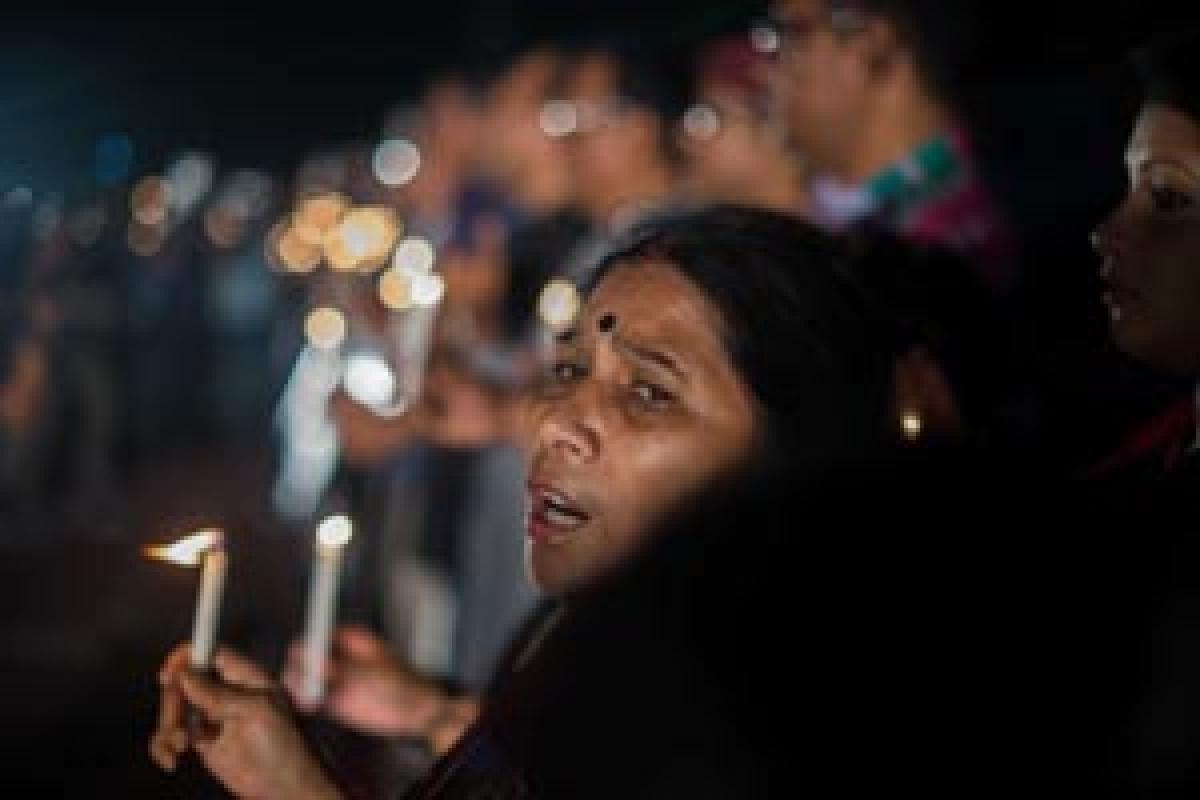Live
- Government Launches Uniform Diet Plan to Boost Student Health and Education
- Robust Security Arrangements for TSPSC Group-2 Exams in Jogulamba Gadwal
- National Lok Adalat Resolves 3387 Cases at Alampur Court
- ‘Get Set, Grow Summit 2024’ Focuses on Digital Detox for Families
- Stokes motivates his team to put in extra effort, says England pacer Potts
- From overcoming setbacks to leading India in U19 Women’s Asia Cup, Niki Prasad's amazing journey
- Driving Enterprise Security: Inside Venkata Reddy Thummala’s Leadership Journey
- Constitution debate: PM Modi hails 'Nari Shakti'; makes strong pitch for 'United Bharat’
- Abhijeet Bhardwaj: Revolutionizing Enterprise Analytics with Innovation and Expertise
- Bihar: Inquiry initiated against principal who went to buy veggies during school hours
Just In

It’s been a bloody month. First, Bangladesh endured its own Mumbai-like suicide attack when heavily armed terrorists targeted a bakery frequented by foreigners in Dhaka’s plush diplomatic quarter last fortnight.
It’s been a bloody month. First, Bangladesh endured its own Mumbai-like suicide attack when heavily armed terrorists targeted a bakery frequented by foreigners in Dhaka’s plush diplomatic quarter last fortnight. They held them hostage and later savagely tortured and butchered 20 people, including a young Indian woman, sparing only those who could recite Quran verses.
Second, terrorists wounding and killing hundreds in US’s Orlando, third Istanbul and recently in Baghdad where a bomb killed over 200 people in a shopping area buzzing with families who had just broken their Ramzan fasts. The Islamic State (IS) claimed responsibility for many and is prime suspect in others.
Notably, one reason for the IS attacks in faraway locations is because it is facing military setbacks in and around the so-called ‘caliphate’, the seat of its influence. Thus, it wants to export terrorism to other countries so as to stay ‘relevant’ and find more recruits. Though Dhaka insisted the café massacre was instigated by local Islamist fundamentalists, Indian and western intelligence agencies confirmed that the attack was mounted by the Bangladeshi module of IS led by Abu Ibrahim al-Hanif with foreigners as the main target.
Whether or not the IS was involved in the attack will be established soon but this conscious targeting of foreigners appears geared to exacerbate the conflict between the State establishment and extremist forces which have waged a bitter and bloody battle. Undeniably, the Sheikh Hasina government’s counter-terrorism policies will be under international pressure now. This sort of scrutiny does occasionally help as with the Lashkar-e-Toiba after the Mumbai attacks, when the Pakistani establishment was forced to rein in the violence if not the group’s infrastructure.
Alas Hasina’s government has nowhere that kind of leverage as many Islamist groups are relentlessly challenging her Administration’s authority. Wherein, terrorists have launched several brutal and violent attacks on bloggers, atheist activists, publishers, Hindus, Shias and foreigners. The mushrooming of radical Islamists has added to the terrorist activity over the last year.
More perplexing is that terrorists unlike their earlier impoverished and rural origin now come from well-educated and affluent backgrounds. Also, they have changed their modus operandi over time which can be easily understood vis-à-vis the place and targets they choose to attack. Besides, the misuse of the internet by terror groups is yet another dismal reality about globalisation. There have been a series of Indian intelligence inputs that a large number of Bangladeshis have been radicalised and indoctrinated by the IS over the internet.
Clearly, terrorism is the new menacing reality of the 21st Century globalised world which knows no borders and aims at people regardless of the country, age, gender, religion and beliefs. Worse, the IS threat today lurks at India’s doors wherein Indian intelligence experts predict that it’s possible that some extremists might flee Bangladesh to escape the crackdown as India shares a porous border with it.
Hasina’s government is opposed to violent Islamists but it has also presided over widespread repression of opposition parties like the Bangladesh Nationalist Party and Jamaat-e-Islami. This alongside the partisan nature of the criminal justice system has bred alienation and enhanced the appeal of extremist organizations and terror groups.
Furthermore, as a politically freighted bureaucracy is too invested in the continuation of a regime and prone to overreach, Hasina’s Administration has cracked down on the media and sections of civil society thereby further undermining its legitimacy. In sum, Bangladesh is experiencing a crisis of public institutions of which terrorism is one manifestation. The focus now will be on finding the conspirators but the country desperately needs a new form of politics and a sequence of steps that will manage social tensions.
By Amrita Banerjee

© 2024 Hyderabad Media House Limited/The Hans India. All rights reserved. Powered by hocalwire.com







